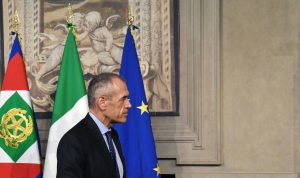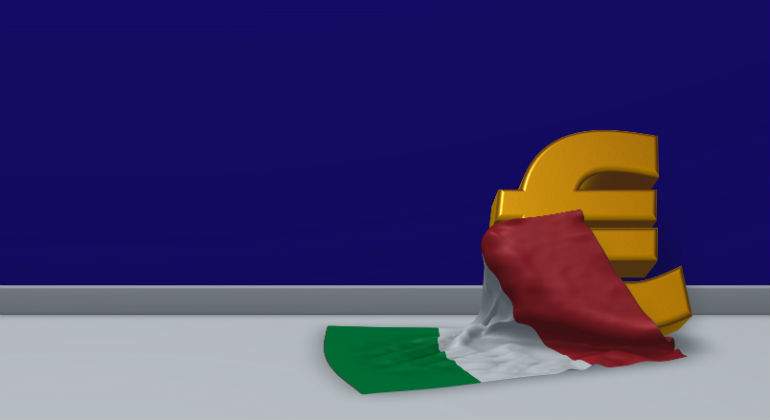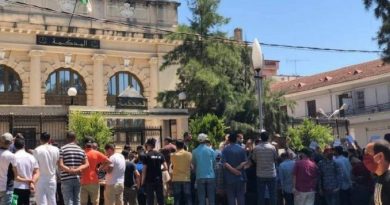Spain and Italy: 2×1 EU crisis
 “The Madrid and Milan Stock Exchanges fall between 2,5% and the 3%. Among the most punished securities in both countries, banks stand out, that suffer a collapse of between 4% and 6%.” The Italian risk premium skyrocketed “until it surpassed the barrier of 300 points, a level that has not been touched since 2013. And it drags up the price of the debt of the entire South: Spain's risk premium scales, and has come to be placed above the 140 points. In Portugal it rises 23 points (until approaching the 200 whole) and in Greece more than 50 points (until surpassing 460 whole).” The euro reached one of its lowest values and many propose that sooner or later there will be a breakup of the currency.
“The Madrid and Milan Stock Exchanges fall between 2,5% and the 3%. Among the most punished securities in both countries, banks stand out, that suffer a collapse of between 4% and 6%.” The Italian risk premium skyrocketed “until it surpassed the barrier of 300 points, a level that has not been touched since 2013. And it drags up the price of the debt of the entire South: Spain's risk premium scales, and has come to be placed above the 140 points. In Portugal it rises 23 points (until approaching the 200 whole) and in Greece more than 50 points (until surpassing 460 whole).” The euro reached one of its lowest values and many propose that sooner or later there will be a breakup of the currency.
The parameters of the secure German economy and some of the Italian one are considered a thermometer to measure the health of European finances and investor confidence, with which the current moment turned on the alert lights. The financial markets of the Spanish State and Italy were shaken by the shock wave of the political crisis that both countries are going through..
The instability concentrated in the respective governments once again demonstrates the problems that the European Union has, beyond the lies told by its staunch defenders.
In the Spanish State, widespread corruption, the economy that has not yet emerged from the crisis 2008, the authoritarian response to the demand for Catalan self-determination, the existence of an exhausted institutional regime, the great mistakes of President M. Rajoy and the PP and a growing general unrest of the population; generated a peak of crisis and the presentation of a motion of censure that will be debated Thursday and Friday. Rajoy went from the offices of the Moncloa Palace to the deck of the Titanic. Beyond the outcome of the motion, The advancement of the elections is on the lips of the majority expressions of politics. (Read more)
The focus of the storm
The financial stampede that caused the fall of the stock market and the banks is a concrete sign of the transfer of political instability to the economy. Because, The bourgeoisie warn that Italy is “few steps” of losing the “investor confidence”.
Italy is used to political cataclysms: in 72 years saw pass 65 prime ministers. Nevertheless, The current crisis worries the bourgeoisie like never before since the post-war period.
It all started with the general elections in March 2018, after the dissolution of Parliament in December 2017. They were chosen 630 members of the Chamber of Deputies and 315 to the Senate for the new legislature. The right-wing coalition won by a simple majority in which the Northern League, headed by Matteo Salvini, In it was Silvio Berlusconi's Forza Italia. The movement 5 stars (M5S) led by Luigi Di Maio, became the most voted party, and the center-left coalition of former Prime Minister Matteo Renzi (Democratic Party), placed third. Since the elections until now, no government has been formed.
There is a consensus on the existence of a fracture that exceeds the gap between the north and the south. A questioning was provoked that threatens to reach the only institution that usually mediates to resolve the imbroglios: the presidency of the Republic, in this case in the hands of Sergio Mattarella.

Last Sunday Mattarella rejected Paolo Savona as Minister of Economy, a euroskeptic who had been proposed to him by La Liga and the M5S. The “anti-establishment” considered it a quasi-coup d’état, They refused to replace him and threatened impeachment..
Mattarella's plan B consisted of entrusting the formation of the Government to Carlo Cotarelli, a technocrat expert in public spending cuts and direct man of the IMF, formed in his bowels. Cotarelli has two possibilities to guide the country: A-If it obtains the support of Parliament, I would do so until the approval of the Budget Law in December, calling for elections in January. This is practically ruled out since La Liga and the M5S have an absolute parliamentary majority.. B- He will have to take charge of the G7 in Canada, the Libya summit in Paris, the European Council and the NATO summit, and call elections in August. This same week he would have to present a list of ministers and go through the chambers of deputies and senators..
Why would the presidential institution be severely affected?? Because it does not have parliamentary strength, There is growing popular unrest and he can be considered as someone who has lost the neutrality granted to him by the Constitution., by defending the European Union and the single currency at all costs; while La Liga and M5S obtained support by accusing Brussels and with anti-EU proposals.
Luigi Di Maio, who is the politician with the most votes 11 million votes, 32%, called for mobilization in Rome 2 of June, against the Government of Cottarelli, calling for Italian flags to be hung on balconies. Matteo Salvini, who leads La Liga and took the 18% of votes, called to fill 1.000 places next weekend.
Maneuvers for speculation about future elections are the order of the day. But the concrete, is that since the last elections in this part a government has not been formed and the perspectives are in the same direction.
Political and economic crises are an intrinsic part of the capitalism system that always imposes its social consequences on the workers and the people..
The European Union in question
The open war in Italy expresses the deep differences that exist regarding membership in the European Union and the euro as a single currency. Today is Italy, before they were Greece, Great Britain and other countries that, in different ways, brought to the fore the debate on the usefulness of the bloc.
In Italy as in other countries, The debate is only carried out by bourgeois organizations, defenders of capitalism. Regrettably, a sector of the left has completely capitulated to the EU, leaving criticism in the hands of right-wing leaders and parties. The EU is an imperialist bloc, employer, exploiter of workers and oppressor of people, that did not bring nor will bring benefits to the great popular majorities.
On the other hand, It is necessary to highlight that the governments and regimes under their orbit are becoming increasingly Bonapartist., undemocratic and discriminatory. It is necessary to debate a proposal that allows the population to be consulted, in a democratic way, What a relationship to have with a bloc that has only proven to serve the imperialists, the rich, banks and large multinational companies.




